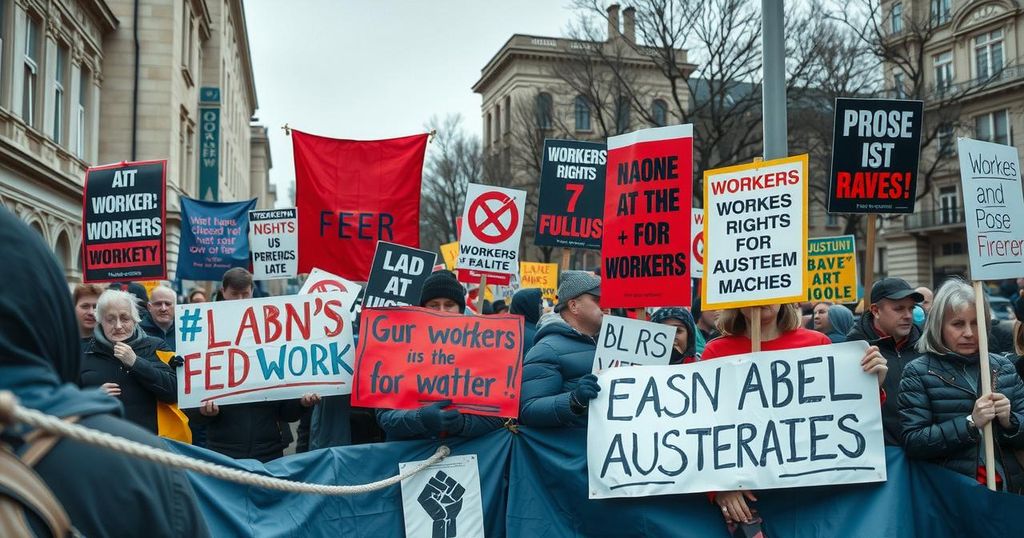Milei Sets Ambitious Inflation Deadline Amid Heightened Union Protests

President Javier Milei pledged that inflation will end by mid-next year as he faces growing union unrest against his severe austerity cuts. Speaking at the EXPO EFI event, he touted positive fiscal changes and a recent IMF agreement, but union leaders led protests against these measures, asserting they disproportionately impact Argentina’s workforce. The social conditions in the country reflect significant inequality amid new labor disputes.
President Javier Milei declared that his government represents “the best in Argentina’s history,” vowing inflation will diminish by mid-next year. However, his optimistic statements seem somewhat optimistic, especially considering the country’s persistent inflation challenges. Meanwhile, unions have begun to voice significant opposition to his severe austerity measures, which many argue are leaving thousands of workers barely scraping by.
During a Wednesday address at the EXPO EFI 2025 event in Buenos Aires, President Milei, who is 54 years old, confidently stated, “Inflation has its sell-by date for the middle of next year and now is the time to think of growth.” This pronouncement follows his assertion that the period of economic stabilization in Argentina has concluded, although he did temper his remarks by acknowledging that the situation is still far from ideal.
The President also applauded the recent easing of harsh currency and capital controls in place since 2019, referring to them as a “monstrous tool that does not permit those who want to save and influences the future.” His administration’s deal with the International Monetary Fund (IMF), worth US$20 billion, was also highlighted in Milei’s speech, where he disparaged skeptics who doubted his ability to strike such an agreement.
However, not long after Milei concluded his address, union leaders initiated a protest march, demonstrating against the austerity measures that many believe are hurting workers and the unemployed. This mostly peaceful Labour Day protest involved thousands of union members from the Confederación General del Trabajo (CGT), Argentina’s leading labor federation. Despite the protests being largely non-confrontational, 14 individuals were arrested for inciting disturbances.
Protesters carried banners and vocalized their grievances against the administration’s economic strategies. A communiqué from the CGT stressed the government’s neglect of workers’ concerns, stating, “the government does not attend grievances, nor does it listen or engage in dialogue while implementing a grave austerity whose cost is being paid by workers and the unemployed with deteriorating incomes.”
The unrest has prompted some unions to take direct action, with the UTA transport union announcing a bus strike scheduled for next week following a round of unproductive negotiations. The government has imposed a strict one-percent monthly limit on collective wage negotiations to curb inflation, which saw a jump to 3.7 percent in March, ahead of the upcoming October midterm elections.
In a recent CGT rally, Father Lorenzo ‘Toto’ de Vedia brought attention to the dire wages and shrinking job opportunities in the country’s underserved neighborhoods. He lamented how the absence of state support has created openings for criminal elements, saying, “the vacuum left by the state is a space filled by narcos.”
Citizens expressed their frustration as well; one cleaning lady, Gisela, lamented, “Nobody can reach the end of the month. There is so much inequality.” Since taking office, Milei has enacted austerity measures that reportedly cut public spending by 4.7 percent of GDP, according to data from the IARAF think tank. These measures have reduced annual inflation from 211 percent to 118 percent, but the higher monthly price hikes continue.
Despite the ongoing crisis, in his EXPO EFI remarks, Milei did not address concerns arising from the CGT rally, instead celebrating what he referred to as a historic cut in government size. His speech reflected a dismissive attitude toward opponents, as he mocked those who worry about social issues, claiming that his government has executed “the biggest adjustment in the history of humanity.”
Political analysts, like Artemio López, suggest the social ramifications of the austerity policies are grave. He pointed out, “The distribution of income is the worst in the last 20 years,” a statement reflective of the emerging economic divide. In parallel, pensioners organized another protest outside Congress on the same day, causing traffic disruptions and highlighting the growing discontent with the government’s measures. Border Guard and Federal Police were deployed to oversee the situation as anti-picketing protocols were enforced.
In summary, President Javier Milei has ambitious plans to curb inflation and reform Argentina’s economic landscape, but rising union unrest illustrates the mounting pressures he faces. While he celebrates policy achievements and fiscal discipline, substantial social discontent continues to surface, with protests highlighting the struggles faced by the working class. As Milei navigates through these challenges, the potential consequences of his austerity measures and their effects on the populace remain a critical concern.
Original Source: www.batimes.com.ar







